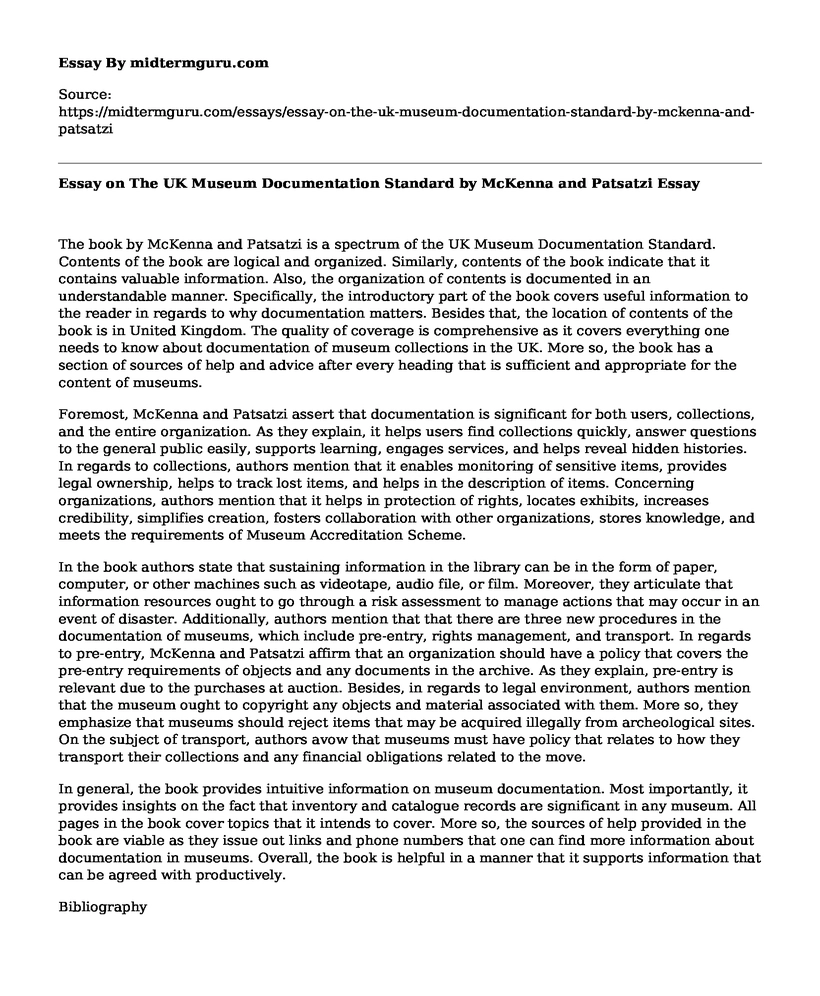The book by McKenna and Patsatzi is a spectrum of the UK Museum Documentation Standard. Contents of the book are logical and organized. Similarly, contents of the book indicate that it contains valuable information. Also, the organization of contents is documented in an understandable manner. Specifically, the introductory part of the book covers useful information to the reader in regards to why documentation matters. Besides that, the location of contents of the book is in United Kingdom. The quality of coverage is comprehensive as it covers everything one needs to know about documentation of museum collections in the UK. More so, the book has a section of sources of help and advice after every heading that is sufficient and appropriate for the content of museums.
Foremost, McKenna and Patsatzi assert that documentation is significant for both users, collections, and the entire organization. As they explain, it helps users find collections quickly, answer questions to the general public easily, supports learning, engages services, and helps reveal hidden histories. In regards to collections, authors mention that it enables monitoring of sensitive items, provides legal ownership, helps to track lost items, and helps in the description of items. Concerning organizations, authors mention that it helps in protection of rights, locates exhibits, increases credibility, simplifies creation, fosters collaboration with other organizations, stores knowledge, and meets the requirements of Museum Accreditation Scheme.
In the book authors state that sustaining information in the library can be in the form of paper, computer, or other machines such as videotape, audio file, or film. Moreover, they articulate that information resources ought to go through a risk assessment to manage actions that may occur in an event of disaster. Additionally, authors mention that that there are three new procedures in the documentation of museums, which include pre-entry, rights management, and transport. In regards to pre-entry, McKenna and Patsatzi affirm that an organization should have a policy that covers the pre-entry requirements of objects and any documents in the archive. As they explain, pre-entry is relevant due to the purchases at auction. Besides, in regards to legal environment, authors mention that the museum ought to copyright any objects and material associated with them. More so, they emphasize that museums should reject items that may be acquired illegally from archeological sites. On the subject of transport, authors avow that museums must have policy that relates to how they transport their collections and any financial obligations related to the move.
In general, the book provides intuitive information on museum documentation. Most importantly, it provides insights on the fact that inventory and catalogue records are significant in any museum. All pages in the book cover topics that it intends to cover. More so, the sources of help provided in the book are viable as they issue out links and phone numbers that one can find more information about documentation in museums. Overall, the book is helpful in a manner that it supports information that can be agreed with productively.
Bibliography
McKenna Gordon and Patsatzi Efthymia. The UK Museum Documentation Standard.
Cambridge: The Spectrum Building. 2007.
Cite this page
Essay on The UK Museum Documentation Standard by McKenna and Patsatzi . (2021, Jun 10). Retrieved from https://midtermguru.com/essays/essay-on-the-uk-museum-documentation-standard-by-mckenna-and-patsatzi
If you are the original author of this essay and no longer wish to have it published on the midtermguru.com website, please click below to request its removal:
- Use of Imagery in Annie Dillards Book Pilgrim at Tinker Creek
- Essays on the YouTube Monetizing and the Internets Impact on the News
- Research Paper on Life of St Antony
- Essay Sample on John Muir: A Lifelong Romance With Nature
- Article Analysis Essay on Effects of Prenatal Music Exposure
- Essay Sample on Writing Process
- Athens & Sparta: Similarities & Differences - Essay Sample







